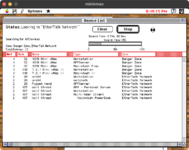thecloud
Well-known member
Indeed, that was the case. Now that I could see the router actually working, I ended up assigning one zone name to the LtoudpPort instance and a different single zone name to the TapPort instance, so all the Mini vMac instances appear in the "Danger Zone" and the rest of the network is "EtherTalk Network". Of course I could have used the same zone name everywhere, but it's nice to see zones appear in the Chooser!The PowerBook still isn't seeing all zones, but a complete shutdown of both TashRouter and atalkd and then restart should clear that up. Its completely normal for routers to develop stale zone tables when you are starting up and shutting down routers one at a time.
Code:
[atalkd.conf]
vioif0 -seed -phase 2 -net 2 -addr 2.22 -zone "EtherTalk Network"
tap0 -seed -phase 2 -net 3 -addr 3.33 -zone "EtherTalk Network"
#note: net range and zone for tap0 interface must exactly match tap0 configuration in TashRouter!
[TashRouter]
router = Router('router', ports=(
LtoudpPort(seed_network=1, seed_zone_name=b'Danger Zone'),
TapPort(tap_name='tap0', hw_addr=b'\xDE\xAD\xBE\xEF\xCA\xFE', seed_network_min=3, seed_network_max=3, seed_zone_names=[b'EtherTalk Network']),
))
#note: hw_addr must NOT match your actual tap0 interface address; use a fake MAC address like DE:AD:BE:EF:CA:FE hereBoth the real and virtual Macs see two zones in this configuration, and can mount shared volumes from servers in either zone. This will make Mini vMac a lot more usable; previously, it was difficult to move files between its filesystem and a modern system.
More pictures!
Attachments
Last edited:



